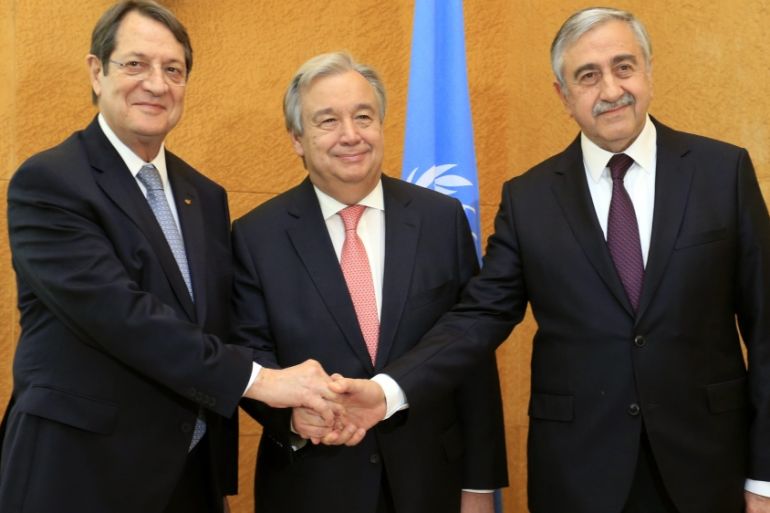Cyprus talks falter over nationalist commemoration row
Turkish Cypriot side rejects meeting after Greek Cypriot move to mark 1950 referendum for union with Greece at schools.

Ongoing talks to reunify Cyprus have hit a hard wall after the Turkish Cypriot side decided not to attend a scheduled meeting between the island’s rival leaders over a Greek Cypriot decision to celebrate a nationalist commemoration at schools.
Greek Cypriot leader Nicos Anastasiades and Turkish Cypriot leader Mustafa Akinci were scheduled to meet on Thursday in the divided island’s buffer zone.
Keep reading
list of 4 itemsRussia-Ukraine war: List of key events, day 783
UN’s Libya envoy resigns citing no hope for political progress
The Take: Remembering one year of war in Sudan
But tensions rose in recent days after a February 10 vote by Greek Cypriot MPs for public schools to honour the anniversary of a 1950 referendum for union with Greece, or “enosis”, the Greek word for union.
Enosis is an outdated marginal ideal for the vast majority of Greek Cypriots, but it is a sensitive issue for many Turkish Cypriots who believe that the idea historically was a core source of the problems on the island.
Only Greek Cypriots voted in the referendum that took place when the island was a British colony and they approved enosis with more than 95 percent of the votes. The vote was not legally binding.
|
|
Ozdil Nami, the Turkish Cypriot negotiator in the peace talks, told Al Jazeera that a decision to commemorate such an event is at odds with the ongoing peace negotiations.
“We have asked the Greek Cypriot side to reverse this decision. And Turkish [Cypriot] side is waiting for the Greek [Cypriot] side to take the necessary steps,” Nami said, adding that it was “in contrast with the spirit of the talks.”
“This move, which [the] international community also finds strange, dignifies unification of Cyprus with Greece. The Greek Cypriot side should scratch this decision and then we can continue talks from where we left.”
Anastasiades and Akinci met last Thursday but their meeting ended early after tensions soared when the topic came up, according to officials from both sides, who accused each other of leaving the table.
“I regret Mr Akinci’s decision not to attend tomorrow’s meeting. I am ready to continue the dialogue at any time,” Anastasiades wrote on Twitter on Wednesday.
Cypriot government spokesman Nikos Christodoulides noted that this was “a very negative development for all the people of Cyprus, Greek Cypriots and Turkish Cypriots, and every one must assume their responsibilities.”
Christodoulides, quoted by the state media, said that Anastasiades was officially informed by UN’s Cyprus envoy, Elizabeth Speharby, that Thursday’s meeting was called off.
Next meeting in March
The leaders had been making progress in the negotiations for reunification as a bizonal, bicommunal federation before the enosis referendum row.
The two sides are scheduled to be joined by Greece, Turkey and the UK, Cyprus’s three post-colonial guarantor powers, in a meeting scheduled for early March in Geneva. A similar meeting in January ended without concrete progress.
The new regulation, which calls on secondary school pupils to learn about the enosis ideal and to commemorate the January 1950 referendum at schools, passed by 19 votes from the smaller parties in the 50 seat House of Representatives.
Anastasiades’ Democratic Rally (DISY), the largest party with 18 members, abstained in the vote, allowing the bill to be passed by nationalist National Popular Front (ELAM), which proposed the amendment, and other small parties.
|
|
Left-wing main opposition Progressive Party of Working People (AKEL) slammed DISY’s abstention.
“Otherwise they want a solution … By choosing to abstain, the DISY allowed the enosis referendum of the 1950s to be honoured at schools,” AKEL said on Twitter, ironically accusing DISY of undermining solution prospects.
The island has been divided between the Turkish north and Greek south since 1974 when Turkish troops invaded a third of the island intervening in an Athens-backed coup to unify with Greece.
The Turkish Republic of Northern Cyprus declared independence in 1983, but has been only recognised by Turkey to date. Turkey still has around 30,000 troops on the island.
Follow Umut Uras on Twitter: @Um_Uras
